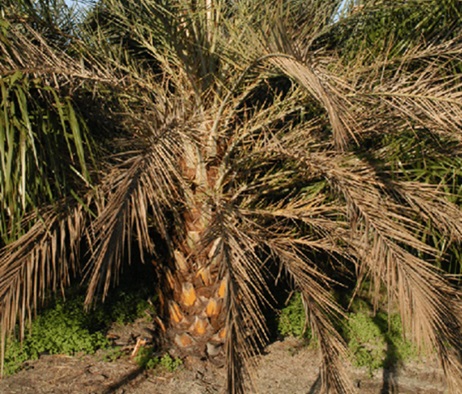What is Texas Phoenix Palm Decline (TPPD)? Texas Phoenix Palm Decline is a deadly disease caused by a phytoplasma, a microscopically small organism similar to a bacteria that attacks the vascular system in palm trees. TPPD was first identified in Texas during the early 2000s. Since then, it has been detected in Florida and in other parts of the southeastern United States. The disease is primarily found in species of the Phoenix genus. This includes Canary Island date Palms (Phoenix Canariensis) as well as date palms and some Sabal palms.
How Disease Spreads
TPPD is spread by insects that feed on phloem, such as plant hoppers. The phytoplasma infects the tree and spreads through the phloem to disrupt the flow of water and nutrients. The palm’s health will gradually decline and eventually die if the disease is not treated.
Symptoms to Look Out For
Texas Phoenix Palm Decline is best managed by early detection. Symptoms include:
- The oldest (lowermost) fronds die prematurely
- The spear leaf suddenly collapses (the leaf that is the newest to emerge from the crown).
- Flower and Fruit Drop
- Yellowing and general canopy thinning
Unfortunately, the disease can often be too advanced by the time that the spear leaves collapse – a hallmark of TPPD – to save the trees.
Manage and Prevent TPPD
Although there is no cure for Texas Phoenix Palm Decline (TPC), preventive measures may help to slow its spread.
- If you start early and continue regularly, antibiotic injections (typically Oxytetracycline), can prolong the life expectancy of a palm infected.
- To reduce the spread of infection, remove and destroy palms that are infected as soon as possible.
- Plant resistant palm trees when you plant new trees in affected areas.
- Sterilize pruning tools to prevent stressing trees by over-pruning and poor irrigation.
Landscapes are becoming more and more important
The Texas Phoenix Palm Decline poses a serious risk to the iconic palms that are used for landscaping in the South. To protect these magnificent trees, awareness, early intervention and proper tree maintenance are vital.
This post was written a professional arborist from Arbor Wise Professional Tree Service . Arbor Wise Professional Tree Care is owned by Robert Miller, an arborist with years of experience. Arborwise Tree Services, a tree service company, offers tree removal, tree trimming, stump grinding and fertilization. Our lawn care business is well-known in the Pinellas County area.

